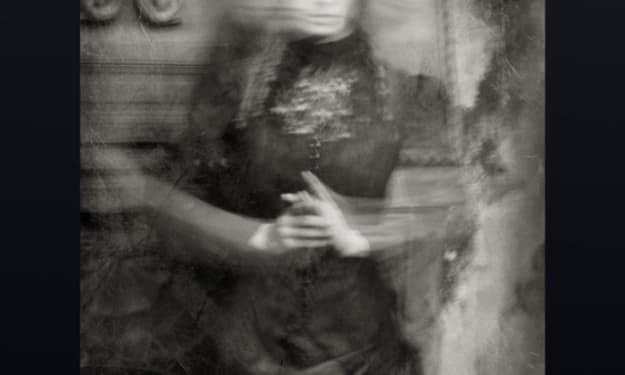The Arabian booth at the Cleveland Bazaar
Based on a true story of my real ancestors.

Cleveland, Ohio, 1865
It was the dead of winter, but the air inside Atheneum Hall was warm and humid. The air smelled like cigar smoke and desire. Bridget watched as gentlemen callers entered her booth—the Turkish booth. She wore an Arabian Princess costume, which exposed her breasts and belly. Having grown up in the cold, boggy West of Ireland, she never imagined princesses wore so little clothing.
Then again, as the gentlemen callers reminded her over and over, she knew very little about the world.
This event was called the Orphan’s Bazaar. The richest men in Cleveland—industrialists who lived on Millionaire’s Row—staged this event every year. They called it charity. For orphans. They raised money for poor, innocent orphans by having young women dress up as their international fantasies. There were Parisian can-can girls and dark-eyed Spanish ladies, batting their eyelashes behind lace fans. But Bridget had been selected to play an Arabian dancer--the most beautiful of all the women at the Bazaar, and therefore the barest.
The Morning Leader, Cleveland’s most important newspaper, described the event in lascivious detail this morning.
“The hall is fitted up and arranged with most admirable taste,” the newspaper gushed. “The booths, twenty in number, are constructed beneath the galleries and are elaborately fitted…presided over by beautiful young ladies, who would have bewildered the brain of our reporter in his bachelor days.”
Bridget, in their minds at least, was one of those beautiful ladies. She didn’t feel beautiful. She felt lower than the mud and dirt the men tracked into the Turkish booth. She was eighteen years old, and her parents were still alive on the other side of the Atlantic. But tonight, she felt like an orphan, crying inside as the men in costumes harassed her.
“Dance for me,” one of the guests demanded. He was wearing a pig mask.
Bridget made eye contact with him, begging him for mercy in silence. And what a stupid idea that was. Even without the mask, his face reminded Bridget of a hog’s, with beady porcine eyes and a snout where her nose should be. Shayla heard a story once about a rabid mob in Ireland who killed their British landlords and fed the bodies to pigs.
This man visiting the Turkish booth looked like one of those pigs, Bridget decided.
“What’s the matter with you, you stupid girl?” he spat. He ashed his cigar on her jeweled brassiere. Black flecks landed on Bridget’s exposed belly. She felt tears well up in her eyes.
“Dance for us, princess,” his friend, also wearing a mask, said. “Tell us your Irish princess story again.”
Bridget drew a sharp breath. “My last name is MacGlynn, or Mag Flhloinn in our language,” she said. She felt as though she had shared this story a thousand times. “It means my Da’s family descends from Flann Sinna, one of the last High Kings of Ireland.”
The men chuckled. It took Bridget a moment to realize they were laughing at her. “And today your ‘Da’s’ kingdom is made up of an acre of land and a pigpen, ain’t that right, Princess?”
Bridget froze. She gripped the Arabian dagger that was part of the Turkish booth’s glitzy decorations. “Get out,” she said, but her voice was so high with fear they didn’t hear her.
Just then, her greatest fear entered the booth. A hangman. He was tall and broad and fully masked, swinging a rope in one hand.
“Step aside,” the hangman said to the other men. “I just purchased her. She’s mine for the night.”
The dagger slipped through Bridget’s thin little fingers. Instead, she reached for the other prop that was part and parcel of the Turkish booth: a bottle of black opium. The hangman was her greatest fear, and now she was ready to surrender herself to death.
Bridget awoke in a private room, the noise of the Bazaar muffled below. The fearsome cold of an Ohio January pierced the walls. But a fire was glowing in the fireplace.
The hangman was standing over her, still in his mask.
“There is no antidote for opium,” he was saying. “I’m familiar with it. Many Irish soldiers got addicted to it after the war against the South. The only treatment is to keep her breathing before it stops her heart.”
Bridget struggled to keep her eyelids parted. Her vision was blurry. “Take off your mask,” she said with rattled breath.
“That I can’t do.”
“Take it off,” Bridget said again, using the last remains of her strength to grab his thick wrist.
“I can’t,” he repeated. “’Tis not just a mask. I lost an eye in the Civil War. This is the one night a year I can hide my ugliness.”
He sat on the bed and stroked Bridget’s hair, praying under his breath. Her lips had a bluish tint, and her skin was so white she looked like a corpse at an Irish wake. He put his finger to her lips and checked for the hint of warm breath. It was there, but barely.
He sat there for what felt like hours, watching her. She wasn’t waking up.
“I hear in your voice that you’re Irish. Do you remember the songs from our land?” he asked, knowing she couldn’t answer him. “Surely you must.”
He sang to her a bit, old Irish songs filled with sorrow and sweetness. Finally, she began to stir, blinking her eyes.
“I’m so tired,” she said.
“I know. Go back to sleep. ’Twill wear off soon.”
“Please don’t send me to the gallows,” she said. A cold tear hit her cheek.
“Me? Oh, my poor girl,” he replied. “This is not real. But promise me one thing. That you’ll quit this job. One day you’ll make love to a man who loves you, not one who bought you. You can’t be doing this.”
Bridget’s eyes glistened with tears. “I don’t have a choice.”
He wrapped his arms around her, trying to pull her to his chest in a warm embrace. He knew he wouldn’t sleep at all tonight if he could hear her anguished tears. It broke his heart.
“You’ll be fine,” he said, and leaned down to kiss her. But at the last second she turned away from his lips, leaving him to kiss her cheek. He tasted the brine of her tears and realized how genuine they were.
She punched him in the chest, which was useless, considering their relative strength and size. “Are you out of your mind?” she said plaintively. “Do you think you’re different from the men down there at the Bazaar? I’m your captive. Don’t you dare kiss me.”
The hangman backed away, folding his arms over his chest.
“I’ll keep my hands firmly to myself.”
A few hours later, Bridget came to again, wrapped in a man’s tartan jacket. He was still next to her, the warmth of his body keeping her alive all night. She was alive. The color had returned to her hands.
His mask was gone, and she could see what was left: a face, badly scarred on one side. He wore an eye patch to cover the hollow pit of his eye socket.
“Can you see me?” she asked.
“A little,” he said, rolling over to cover her with his arms. “Nah, my eyesight is not great, my dear. I'm missing one, and the other has never been the same. Not since the war. But I saw enough to know you were beautiful."
He squeezed her hand. “Besides,” he said, his voice low. "I feel you.”
She took a deep breath and unhooked the heavy brassiere she still wore under the man’s jacket. She cast it aside, relieved to be rid of it. She shifted onto her elbows. Then, she lowered her head to kiss him at the base of his neck.
“I feel you as well.”
About the Creator
Ashley Herzog
If you like my work, feel free to tip your writer.






Comments
There are no comments for this story
Be the first to respond and start the conversation.